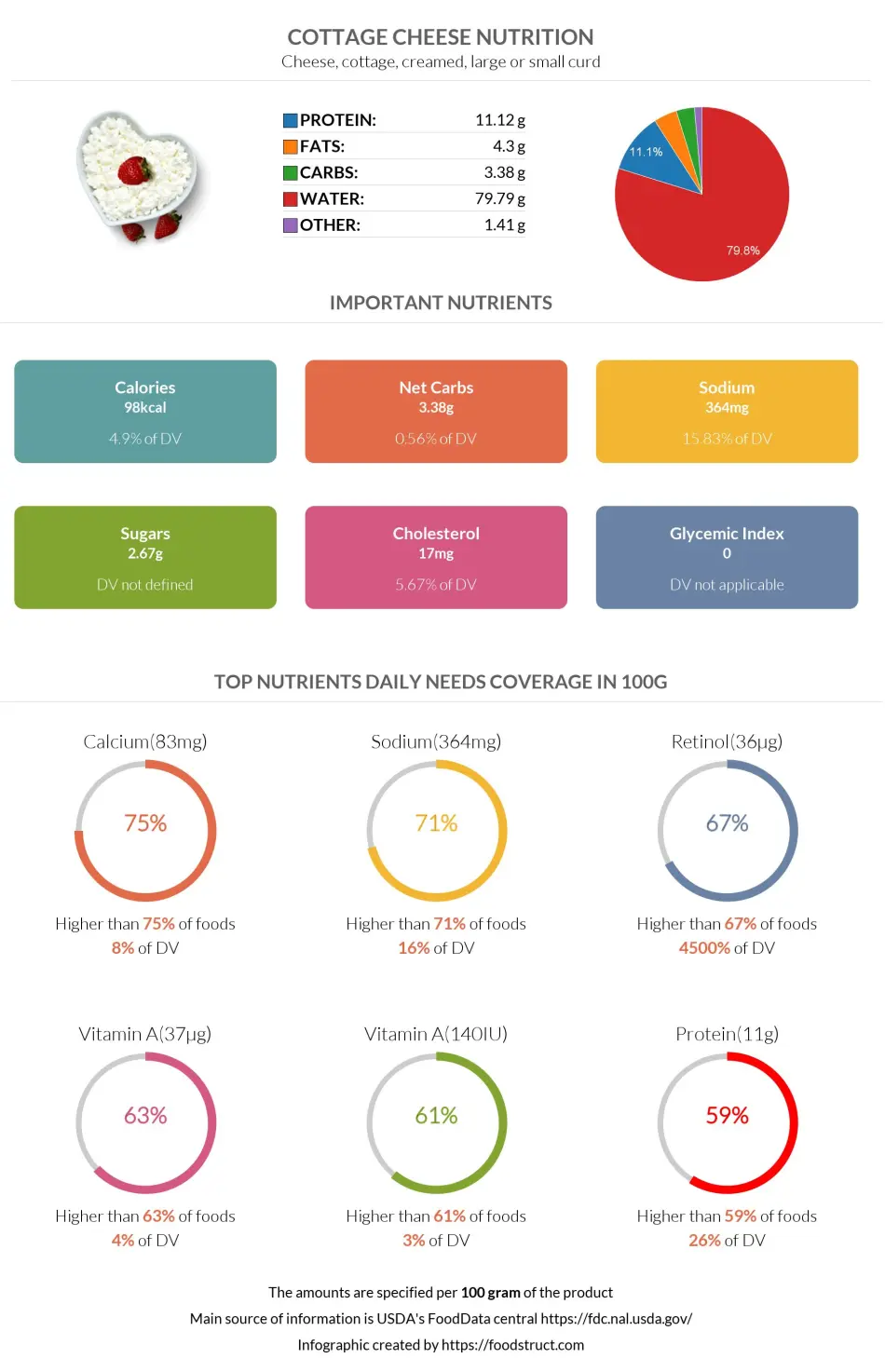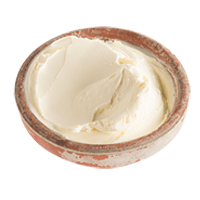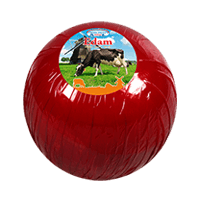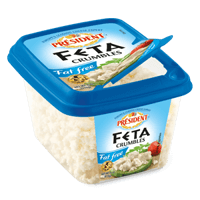Cottage cheese nutrition: calories, carbs, GI, protein, fiber, fats
Cheese, cottage, creamed, large or small curd
*all the values are displayed for the amount of 100 grams
Top nutrition facts for Cottage cheese

| Calories ⓘ Calories for selected serving | 98 kcal |
|
Glycemic index ⓘ
Source: Check out our full article on Cottage cheese glycemic index https://www.sciencedirect.com/science/article/pii/S0002916522004944Check out our Glycemic index chart page for the full list.
|
10 (low) |
| Insulin index ⓘ https://ses.library.usyd.edu.au/handle/2123/11945 – II for reduced-fat cottage cheese is 40 | 40 |
| Net Carbs ⓘ Net Carbs = Total Carbohydrates – Fiber – Sugar Alcohols | 3 grams |
| Default serving size ⓘ Serving sizes are mostly taken from FDA's Reference Amounts Customarily Consumed (RACCs) | 4 oz (113 grams) |
| Acidity (Based on PRAL) ⓘ PRAL (Potential renal acid load) is calculated using a formula. On the PRAL scale the higher the positive value, the more is the acidifying effect on the body. The lower the negative value, the higher the alkalinity of the food. 0 is neutral. | 7.9 (acidic) |
| Oxalates ⓘ https://www.hsph.harvard.edu/nutrition-questionnaire-service-center/nutrient-tables-download-page/ | 0 mg |
Cottage cheese calories (kcal)
| Calories for different serving sizes of cottage cheese | Calories | Weight |
|---|---|---|
| Calories in 100 grams | 98 | |
| Calories in 4 oz | 111 | 113 g |
| Calories for different varieties of cottage cheese | Calories | Weight |
|---|---|---|
| Cheese, cottage, creamed, large or small curd (this food) | 98 | 100 g |
| Cheese, cottage, nonfat, uncreamed, dry, large or small curd | 72 | 100 g |
| Cheese, cottage, lowfat, 1% milkfat | 72 | 100 g |
| Cheese, cottage, lowfat, 2% milkfat | 81 | 100 g |
| Cheese, cottage, creamed, with fruit | 97 | 100 g |
Cottage cheese Glycemic index (GI)
Source:
Check out our full article on Cottage cheese glycemic index
https://www.sciencedirect.com/science/article/pii/S0002916522004944Check out our Glycemic index chart page for the full list.
Mineral coverage chart
Mineral chart - relative view
Vitamin coverage chart
Vitamin A:
111µg of 900µg
12%
Vitamin E:
0.24mg of 15mg
1.6%
Vitamin D:
0.3µg of 20µg
1.5%
Vitamin C:
0mg of 90mg
0%
Vitamin B1:
0.08mg of 1mg
6.8%
Vitamin B2:
0.49mg of 1mg
38%
Vitamin B3:
0.3mg of 16mg
1.9%
Vitamin B5:
1.7mg of 5mg
33%
Vitamin B6:
0.14mg of 1mg
11%
Folate:
36µg of 400µg
9%
Vitamin B12:
1.3µg of 2µg
54%
Vitamin K:
0µg of 120µg
0%
Vitamin chart - relative view
Macronutrients chart
Protein:
Daily Value: 22%
11.1 g of 50 g
11.1 g (22% of DV )
Fats:
Daily Value: 7%
4.3 g of 65 g
4.3 g (7% of DV )
Carbs:
Daily Value: 1%
3.4 g of 300 g
3.4 g (1% of DV )
Water:
Daily Value: 4%
79.8 g of 2,000 g
79.8 g (4% of DV )
Other:
1.4 g
1.4 g
Protein quality breakdown
Tryptophan:
441mg of 280mg
158%
Threonine:
1500mg of 1,050mg
143%
Isoleucine:
1773mg of 1,400mg
127%
Leucine:
3348mg of 2,730mg
123%
Lysine:
2802mg of 2,100mg
133%
Methionine:
807mg of 1,050mg
77%
Phenylalanine:
1731mg of 1,750mg
99%
Valine:
2244mg of 1,820mg
123%
Histidine:
978mg of 700mg
140%
Fat type information
Saturated fat:
1.7 g
Monounsaturated fat:
0.78 g
Polyunsaturated fat:
0.12 g
Carbohydrate type breakdown
Starch:
0 g
Sucrose:
0 g
Glucose:
0 g
Fructose:
0 g
Lactose:
2.7 g
Maltose:
0 g
Galactose:
0 g
Fiber content ratio for Cottage cheese
Sugar:
2.7 g
Fiber:
0 g
Other:
0.71 g
All nutrients for Cottage cheese per 100g
| Nutrient | Value | DV% | In TOP % of foods | Comparison |
| Vitamin A | 37µg | 4% | 37% | |
| Calories | 98kcal | 5% | 74% |
2.1 times more than Orange
|
| Protein | 11g | 26% | 41% |
3.9 times more than Broccoli
|
| Fats | 4.3g | 7% | 54% |
7.7 times less than Cheese
|
| Vitamin C | 0mg | 0% | 100% |
N/A
|
| Net carbs | 3.4g | N/A | 62% |
16 times less than Chocolate
|
| Carbs | 3.4g | 1% | 65% |
8.3 times less than Rice
|
| Cholesterol | 17mg | 6% | 44% |
21.9 times less than Egg
|
| Vitamin D | 0.1µg | 1% | 60% |
22 times less than Egg
|
| Magnesium | 8mg | 2% | 87% |
17.5 times less than Almonds
|
| Calcium | 83mg | 8% | 25% |
1.5 times less than Milk
|
| Potassium | 104mg | 3% | 82% |
1.4 times less than Cucumber
|
| Iron | 0.07mg | 1% | 94% |
37.1 times less than Beef broiled
|
| Sugar | 2.7g | N/A | 56% |
3.4 times less than Coca-Cola
|
| Fiber | 0g | 0% | 100% |
N/A
|
| Copper | 0.03mg | 3% | 89% |
4.9 times less than Shiitake
|
| Zinc | 0.4mg | 4% | 75% |
15.8 times less than Beef broiled
|
| Phosphorus | 159mg | 23% | 50% |
1.1 times less than Chicken meat
|
| Sodium | 364mg | 16% | 29% |
1.3 times less than White bread
|
| Vitamin E | 0.08mg | 1% | 88% |
18.3 times less than Kiwi
|
| Manganese | 0mg | 0% | 98% | |
| Selenium | 9.7µg | 18% | 60% | |
| Vitamin B1 | 0.03mg | 2% | 84% |
9.9 times less than Pea raw
|
| Vitamin B2 | 0.16mg | 13% | 55% |
1.3 times more than Avocado
|
| Vitamin B3 | 0.1mg | 1% | 92% |
96.7 times less than Turkey meat
|
| Vitamin B5 | 0.56mg | 11% | 55% |
2 times less than Sunflower seeds
|
| Vitamin B6 | 0.05mg | 4% | 80% |
2.6 times less than Oats
|
| Vitamin B12 | 0.43µg | 18% | 51% |
1.6 times less than Pork
|
| Vitamin K | 0µg | 0% | 100% |
N/A
|
| Folate | 12µg | 3% | 57% |
5.1 times less than Brussels sprouts
|
| Choline | 18mg | 3% | 76% | |
| Saturated fat | 1.7g | 9% | 50% |
3.4 times less than Beef broiled
|
| Monounsaturated fat | 0.78g | N/A | 68% |
12.6 times less than Avocado
|
| Polyunsaturated fat | 0.12g | N/A | 83% |
383.5 times less than Walnut
|
| Tryptophan | 0.15mg | 0% | 72% |
2.1 times less than Chicken meat
|
| Threonine | 0.5mg | 0% | 73% |
1.4 times less than Beef broiled
|
| Isoleucine | 0.59mg | 0% | 72% |
1.5 times less than Salmon raw
|
| Leucine | 1.1mg | 0% | 72% |
2.2 times less than Tuna Bluefin
|
| Lysine | 0.93mg | 0% | 71% |
2.1 times more than Tofu
|
| Methionine | 0.27mg | 0% | 73% |
2.8 times more than Quinoa
|
| Phenylalanine | 0.58mg | 0% | 73% |
1.2 times less than Egg
|
| Valine | 0.75mg | 0% | 70% |
2.7 times less than Soybean raw
|
| Histidine | 0.33mg | 0% | 73% |
2.3 times less than Turkey meat
|
| Fructose | 0g | 0% | 100% |
N/A
|
| Caffeine | 0mg | 0% | 100% | |
| Omega-3 - EPA | 0g | N/A | 100% |
N/A
|
| Omega-3 - DHA | 0g | N/A | 100% |
N/A
|
| Omega-3 - DPA | 0g | N/A | 100% |
N/A
|
Check out similar food or compare with current
NUTRITION FACTS LABEL
Nutrition Facts
___servings per container
Serving Size ______________
Serving Size ______________
Amount Per 100g
Calories 98
% Daily Value*
6.6%
Total Fat
4.3g
7.8%
Saturated Fat 1.7g
0
Trans Fat
0g
5.7%
Cholesterol 17mg
16%
Sodium 364mg
1.1%
Total Carbohydrate
3.4g
0
Dietary Fiber
0g
Total Sugars 0g
Includes ? g Added Sugars
Protein
11g
Vitamin D
3mcg
0.38%
Calcium
83mg
8.3%
Iron
0.07mg
0.88%
Potassium
104mg
3.1%
*
The % Daily Value (DV) tells you how much a nutrient in a serving of food contributes to a daily diet. 2,000 calories a day is used for general nutrition advice.
Health checks
ⓘ
Dietary cholesterol is not associated with an increased risk of coronary heart disease in healthy individuals. However, dietary cholesterol is common in foods that are high in harmful saturated fats.
Source
Low in Cholesterol
ⓘ
Trans fat consumption increases the risk of cardiovascular disease and mortality by negatively affecting blood lipid levels.
Source
No Trans Fats
ⓘ
Saturated fat intake can raise total cholesterol and LDL (low-density lipoprotein) levels, leading to an increased risk of atherosclerosis. Dietary guidelines recommend limiting saturated fats to under 10% of calories a day.
Source
Low in Saturated Fats
ⓘ
While the consumption of moderate amounts of added sugars is not detrimental to health, an excessive intake can increase the risk of obesity, and therefore, diabetes.
Source
Low in Sugars
Cottage cheese nutrition infographic

Infographic link
References
All the values for which the sources are not specified explicitly are taken from FDA’s Food Central. The exact link to the food presented on this page can be found below.


